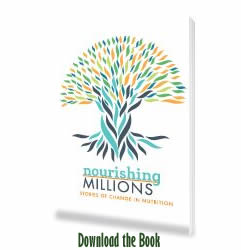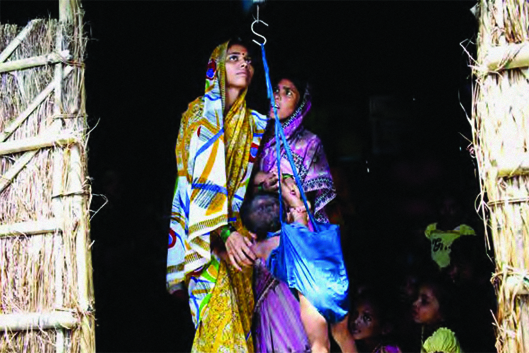Nourishing Millions and Stories of Change in Nutrition
 Statistics are important in fighting global hunger and malnutrition, but it is also critical not to forget the names, faces and stories of those who experience them first-hand. This is the impetus behind two linked projects: Nourishing Millions, a book which brings together stories about improving nutrition in the past five decades, and Stories of Change in Nutrition, a series
Statistics are important in fighting global hunger and malnutrition, but it is also critical not to forget the names, faces and stories of those who experience them first-hand. This is the impetus behind two linked projects: Nourishing Millions, a book which brings together stories about improving nutrition in the past five decades, and Stories of Change in Nutrition, a series
of in-depth case studies in six countries.
 The stories in Nourishing Millions examine interventions that address nutrition directly – such as community nutrition and feeding programmes for infants and young children – as well as nutrition-sensitive policies related to agriculture, social protection and clean water and sanitation. The authors consider the range of efforts to combat malnutrition in all its forms, including severe acute malnutrition (SAM), stunting, micronutrient deficiency and overweight and obesity. They shed light on nutrition success stories on the ground in places ranging from Bangladesh, Brazil, Nepal, Peru, Thailand, Vietnam and Ethiopia to the state of Odisha in India. The book also examines how nutrition ‘champions’ emerge and drive change.
The stories in Nourishing Millions examine interventions that address nutrition directly – such as community nutrition and feeding programmes for infants and young children – as well as nutrition-sensitive policies related to agriculture, social protection and clean water and sanitation. The authors consider the range of efforts to combat malnutrition in all its forms, including severe acute malnutrition (SAM), stunting, micronutrient deficiency and overweight and obesity. They shed light on nutrition success stories on the ground in places ranging from Bangladesh, Brazil, Nepal, Peru, Thailand, Vietnam and Ethiopia to the state of Odisha in India. The book also examines how nutrition ‘champions’ emerge and drive change.
Nutrition narratives
 It is well known that good nutrition depends not only on people’s access to a wide variety of foods, but also on the care they receive and the environment in which they live. A number of countries and programmes have used this broader understanding of nutrition to make progress at the country level. These narratives provide insights into what works in nutrition, what does not, and the factors that can contribute to success in implementing nutrition-relevant programmes to accelerate and scale up impact on the ground. Examples of the findings include:
It is well known that good nutrition depends not only on people’s access to a wide variety of foods, but also on the care they receive and the environment in which they live. A number of countries and programmes have used this broader understanding of nutrition to make progress at the country level. These narratives provide insights into what works in nutrition, what does not, and the factors that can contribute to success in implementing nutrition-relevant programmes to accelerate and scale up impact on the ground. Examples of the findings include:
• The move from centralised, inpatient care for SAM to the community-based management of acute malnutrition (CMAM) is the story of one of the most important paradigm shifts in public health nutrition in the last decade.
• Mexico’s successful PROGRESA programme (subsequently known as Oportunidades and then Prospera) illustrates how social protection interventions work most effectively to improve nutrition when combined with behaviourchange communications.
• Nepal’s success story in reducing stunting from 48% to 27% between 1996 and 2011 is described and the multi-sector approach that fostered improvement in health services, sanitation, wealth and parental education is explored.
• Since independence, Bangladesh has had one of the highest rates of child under-nutrition in the world, but community-based initiatives such as the SHOUHARDO programme (2005 to 2010) directly targeted the nutrition and health of mothers and children, with interventions focused on water, sanitation and homestead food production. Marked reductions in the prevalence of child stunting were reported, dropping from 62% to 49% over a four-year period’.
Stories of Change in Nutrition is a series of in-depth, structured case studies in six countries: Bangladesh, Nepal, Odisha (India), Ethiopia, Senegal and Zambia. The stories, all evidence-based, aim to improve understanding of the key factors that seem to drive reductions in under-nutrition, and how enabling environments and pro-nutrition policy and implementation processes can be cultivated and sustained. For example, Odisha, a state in India, has performed better in reducing under-nutrition than richer states. To understand why, researchers developed a 25-year timeline from 1991 to 2015, using various data sources, including content analysis of documents (such as DHS data), stakeholder interviews at the state level (government staff, civil society members) and community members (mothers and frontline workers). The data suggest that many of the immediate determinants of nutrition improved, such as exclusive breastfeeding, supported by scaling-up of associated policies and programmes, but several underlying and basic determinants, especially sanitation and poverty, improved less over the years. Each case study concludes with recommendations for future action. The research is summarised in country briefs.
References
Gillespie S, Hodge J, Yosef S and Pandya-Lorch R, eds. 2016. Nourishing Millions: Stories of Change in Nutrition. Washington, DC: International Food Policy Research Institute. nourishingmillions.ifpri.info
Stories of Change in Nutrition case studies and country briefs www.transformnutrition.org/stories_of_change/
